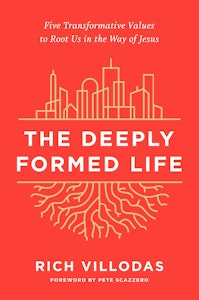 Excerpt from The Deeply Formed Life
Excerpt from The Deeply Formed Life
Dangerously Depleted
Our lives easily can take us to the brink of burnout. The pace we live is often destructive. The lack of margin is debilitating. We are a worn-out people. In all of this, the problem before us is not just the frenetic pace we live, but what gets pushed out from our lives as a result; that is, life with God. Parker Palmer makes a compelling case that burnout typically does not come about because I’ve given so much of myself that I have nothing left, but rather “it merely reveals the nothingness from which I was trying to give in the first place.”
What would it look like to live at a different pace? What if there were a rhythm of life that could instead enable us to deeply connect with God, a lifestyle not dominated by hurry and exhaustion but by margin and joy? As long as we remain captive to a culture of speed, superficiality, and distraction, we will not be the people God longs for us to be. We desperately need a spirituality that roots us in a different way.
From all walks of life and professions, our struggle is all too real: single parents trying to find just a moment of oasis from the incessant bickering of children, doctors caught in the unending pressures of life-and-death choices, and pastors over-functioning to the point of health breakdown. There are schoolteachers whose work never really ends, sleep-deprived students floundering through exams, immigrant small-business owners struggling to make ends meet, and therapists and social workers overwhelmed with the bottomless crises they need to resolve daily. The pace of our lives can be brutal.
Without denying these realities, we are invited to a different way of being in the world. The late Japanese theologian, Kosuke Koyama wrote a book entitled Three Mile-an-Hour God. Dr. Koyama was trying to get at the notion that if we want to connect with God, we’d be wise to travel at God’s speed. God has all the time in the world, and as a result God is not in a rush. Thus his claim that God travels at three miles an hour — it’s not an arbitrary figure. On average, humans walk at this pace. And it’s in just such ambling, unhurried, and leisurely moments that we often encounter God. N. T. Wright similarly affirms, “It is only when we slow down our lives that we can catch up to God.” This is the paradox of contemplative rhythms.
Now don’t get me wrong. I’m not advocating that we go back to dial-up internet service and take boats instead of airplanes to our destinations. Speed has helped to remake our world in ways that are wonderful and liberating. But speed has also caused our connections with God, ourselves, and others to be incredibly superficial. There’s a severe lack of depth in our lives and communities because we have allowed ourselves to be swept up by the way of the world’s pace. The world operates under the influence of addictive speed. And as Dallas Willard famously said, “The greatest enemy to the spiritual life is hurry.”
In the face of this crisis of speed, distraction, and superficial spirituality, there is a way that has been tried and tested through the centuries. It’s a way that has marked my life from the time I became a Christian in my early 20s. It’s the way of the monastic, contemplative life. We live in a time where we must learn from the monastery. We desperately need a way of thinking and living that isn’t captive to the powers of efficiency, speed, and performance. We need a way of life that lives according to a different understanding of time and space. We need the treasures of monastic imagination.
Related Podcast
Excerpted from The Deeply Formed Life. Copyright © 2020 by Richard A. Villodas Jr. Published by WaterBrook, an imprint of Penguin Random House LLC.
Rich Villodas is the author of The Deeply Formed Life and Brooklyn-born lead pastor of New Life Fellowship, a large, multiracial church with more than 75 countries represented in Elmhurst, Queens. Visit him online at www.richvillodas.com and @richvillodas
Photo by Diana Simumpande on Unsplash
Text First Published September 2020 · Last Featured on Renovare.org April 2024


